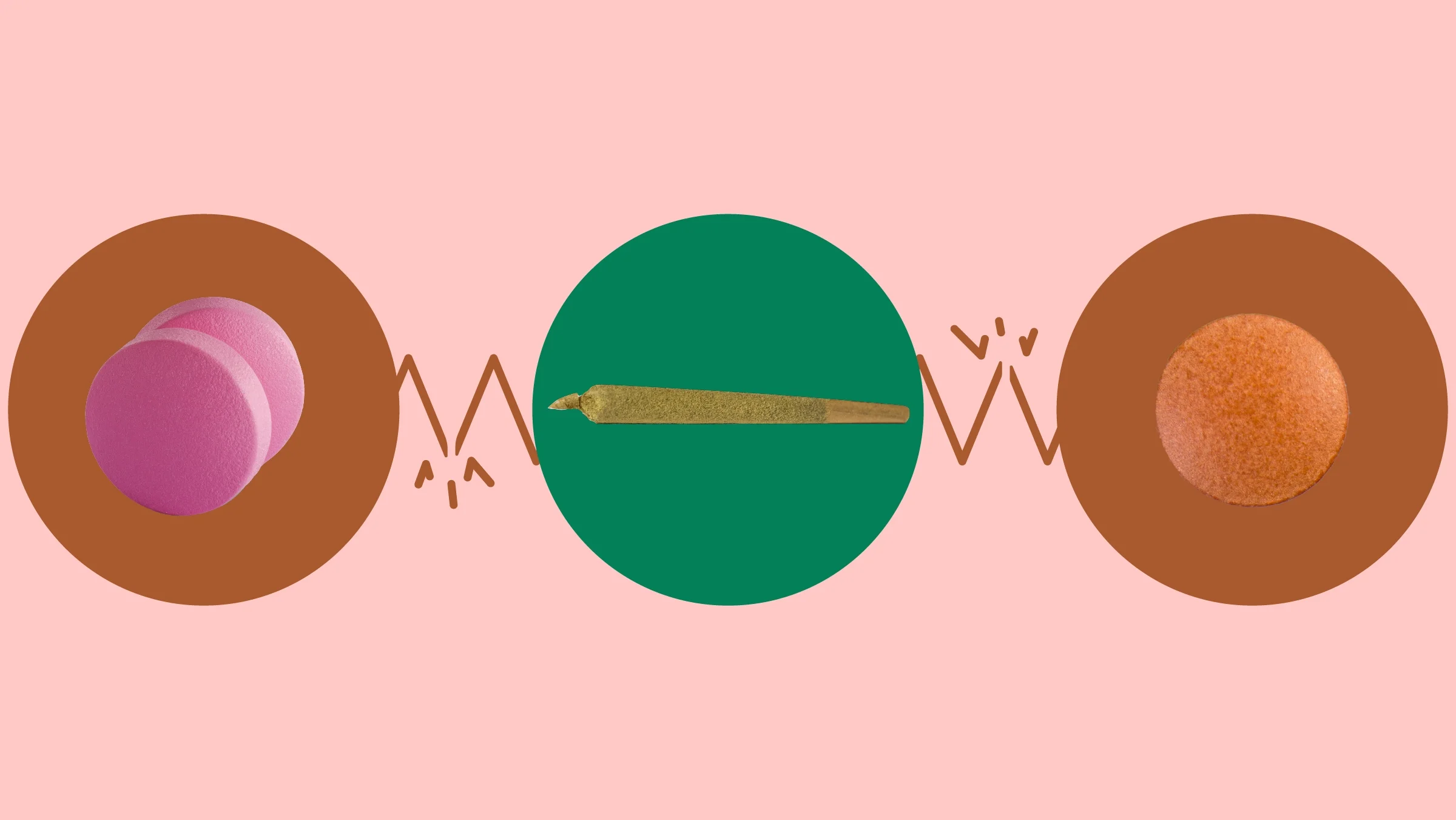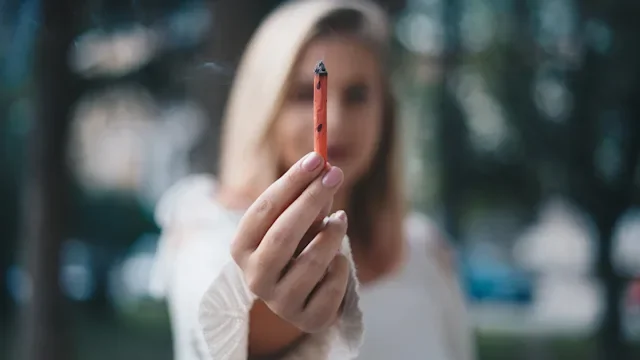Key takeaways:
Cannabis has several interactions to be aware of. You should avoid combining weed and melatonin, warfarin (Coumadin, Jantoven), and transplant medications. Cannabis may worsen side effects of these medications, which can be harmful in some cases.
It’s best to avoid or limit cannabis if you’re taking medications for mental health conditions, heart-related issues, or to control seizures. Cannabis may worsen these conditions, as well as interact with some medications used to treat them.
Cannabis may make immunotherapy cancer treatment less effective. So talk to your cancer care team before using it to make sure it’s a safe option for you.
As more people turn to cannabis for both medical and recreational use, it’s important to understand how it interacts with other medications and supplements. This knowledge can help protect your safety and ensure that your medications work the way they’re supposed to.
Here, we’ll review nine cannabis interactions to be aware of. Keep in mind, this isn’t a complete list of all possible interactions. So it’s best to review your medication list with a healthcare professional before adding cannabis to the mix to make sure it’s a safe option for you.
Good to know: This article focuses on cannabis products that contain tetrahydrocannabinol (THC). If you’re looking for information on cannabidiol (CBD) interactions, check out our separate article on that topic.
1. Melatonin
A common question about cannabis interactions is whether it’s safe to mix weed and melatonin. Both are often used on their own to help with sleep problems. But the truth is, we don’t know much about the safety of taking them together.
Search and compare options
One study showed that combining THC and melatonin can raise THC levels in the body. This could lead to unwanted cannabis-related side effects, such as intoxication, dizziness, and anxiety.
In general, it’s best to avoid taking more than one sleep product at the same time unless a healthcare professional tells you to do so. Doing so could lead to excessive sleepiness. It could also make next-day drowsiness more likely. It’s generally best to try one sleep product at a time to find the one that works best for you.
That being said, some over-the-counter (OTC) sleep products contain multiple ingredients. And cannabinoids such as cannabidiol (CBD) and cannabinol (CBN) are often found in sleep products along with melatonin.
One study of over 1,000 adults with sleep problems showed that a combination of CBD, CBN, and melatonin is likely safe. But it didn’t provide better sleep results than taking CBD or melatonin alone. These combination products also often contain different ingredients or amounts than what’s listed on the package. So it’s best to avoid them unless they’re suggested by your prescriber.
2. Warfarin
Warfarin (Coumadin, Jantoven) is a blood thinner that helps prevent blood clots. THC can interfere with how your body breaks down warfarin, increasing warfarin levels in your blood. This raises your risk of bleeding.
If you take warfarin, you’ll likely receive regular blood tests to make sure it isn’t too thick or thin. It’s important to be honest with your healthcare team about any cannabis use, since it can affect these test results and your bleeding risk. They may need to adjust your warfarin dose or consider an alternate blood thinner to prevent serious bleeding. In some cases, they may recommend avoiding cannabis completely.
Cannabis and “the munchies”: Here’s why weed makes you hungry and how you can avoid this side effect.
Can you overdose on weed? Taking too much cannabis isn’t likely to be fatal, but it has serious risks and side effects to be aware of.
How long do edibles last? Learn why cannabis edibles last longer in the body, along with tips to consume them safely.
3. Mental health medications
Cannabis can interact with many medications that treat mental health conditions.
In some cases, cannabis may worsen mental health symptoms such as anxiety, depression, and psychosis, making them even harder to manage.
Cannabis can also interact with some mental health medications directly, raising or lowering their levels in your body. This can make them less effective or raise the risk of side effects or even toxicity in some cases.
Examples of mental health medications that may interact with cannabis include:
Sertraline (Zoloft)
Citalopram (Celexa)
Escitalopram (Lexapro)
Fluoxetine (Prozac)
Mirtazapine (Remeron)
Fluvoxamine (Luvox)
Trazodone
Quetiapine (Seroquel)
Aripiprazole (Abilify)
Clozapine
Chlorpromazine
Lithium (Lithobid)
Tricyclic antidepressants, such as amitriptyline
The relationship between cannabis and mental health is complex. It may be possible for you to consume cannabis while taking medication for a mental health-related condition. But you shouldn’t do so without the guidance of a trained healthcare professional.
It’s also helpful to let your prescriber know if you’re already self-medicating with cannabis before starting a new medication for mental health-related symptoms. This will help them choose an option that’s less likely to cause a problem for you.
4. Heart-related medications
Cannabis may indirectly interact with heart-related medications. THC can raise your heart rate and blood pressure. And cannabis use is associated with an increased risk of heart attack, even in young adults without other cardiac risk factors.
If you’re taking medication to manage high blood pressure or other heart-related conditions, cannabis may worsen the symptoms you’re trying to treat. It could also increase the risk of a heart attack or other heart-related cannabis side effects. Examples of heart-related medications include:
Angiotensin-converting enzyme (ACE) inhibitors, such as lisinopril (Zestril)
Angiotensin II receptor blockers, such as candesartan (Atacand)
Calcium channel blockers, such as amlodipine (Norvasc)
Beta blockers, such as metoprolol (Lopressor, Toprol XL)
Diuretics (water pills), such as chlorthalidone (Thalitone)
Cholesterol medications, such as statins
Medications to regulate your heartbeat, such as Pacerone (amiodarone)
Medications for heart failure, such as Lanoxin (digoxin)
You should talk to a healthcare professional before using cannabis if you have heart concerns. They can help you understand the risks and determine if it’s a safe option for you.
5. Buprenorphine
Buprenorphine helps treat opioid use disorder. It’s available on its own as a generic tablet as well as an injection (Sublocade, Brixadi). Buprenorphine is also available in combination with naloxone under the brand name Suboxone. It helps reduce cravings and withdrawal symptoms, making recovery more manageable. Buprenorphine also comes in an oral film (Belbuca) and skin patch (Butrans) that are approved to treat chronic pain.
Cannabis can raise buprenorphine levels in your body by a large amount if they’re combined. This could lead to a greater risk of buprenorphine side effects, such as headache, nausea, and constipation.
Let your prescriber know you’re consuming cannabis before starting buprenorphine. They may decide to start you with a lower dosage to help manage this interaction. But don’t stop consuming cannabis on your own if you’re already using it with buprenorphine. This could cause your buprenorphine levels to drop, which could raise your risk of relapse. Talk to your prescriber about how to stop using cannabis safely.
6. Antiseizure medications
Cannabis has gained a lot of attention for its ability to help control seizures in certain people. But you shouldn’t try to use cannabis to treat seizures on your own, because:
Cannabis isn’t a first-choice treatment option. In most cases, cannabis is reserved for those who don’t respond to prescription antiseizure medications or are unable to tolerate them.
Not all cannabis products work the same way for seizures. CBD is the only cannabis ingredient that’s been FDA-approved to treat certain types of seizures in the form of Epidiolex. Cannabis products that contain THC may be ineffective or even worsen seizure activity in some cases.
Cannabis can interact with some antiseizure medications. Examples include valproic acid (Depakote), phenytoin (Dilantin) and carbamazepine (Tegretol).
If your seizures are well-controlled with medication, it’s best to avoid cannabis altogether. As explained above, it could interfere with your medication levels or even worsen seizure activity. If your seizures aren’t responding to medication, talk to your prescriber about other options, including CBD. But don’t try to self-medicate with cannabis on your own
7. Organ transplant medications, such as tacrolimus
Cannabis can interact with medications used to prevent organ rejection in people who’ve had a transplant. Examples include:
Tacrolimus (Prograf, Envarsus XR)
Cyclosporine
Sirolimus (Rapamune)
Everolimus (Zortress)
Cannabis may increase the levels of these medications in the body. This can lead to serious side effects, such as kidney damage, tremors, or infections.
If you take tacrolimus or other immunosuppressant medications, it’s best to avoid using cannabis unless your prescriber recommends it.
8. Alcohol and other sedatives
Sedatives slow down your nervous system, causing drowsiness and slower thinking. Common sedatives include:
Benzodiazepines, such as alprazolam (Xanax)
Sleep medications, such as zolpidem (Ambien)
Combining THC with these substances may raise the risk of impairment and make side effects more severe. It can also raise the risk of falls, impaired judgement, and accidental overdose. It’s best to avoid combining cannabis with these medications and substances unless directed to by a healthcare professional.
9. Immunotherapy
Immunotherapy is a type of cancer treatment that helps your immune system find and kill cancer cells. Cannabis may lower the activity of your immune system, which can prevent immunotherapy from working properly.
One study looked at the immunotherapy medication nivolumab (Opdivo). It found that in people using cannabis, only 16% saw their tumors shrink, compared with 38% of people who didn't use cannabis. That being said, some scientists disagree with how this study was conducted and aren’t convinced of the results.
Until we know more about cannabis and immunotherapy, it’s best to discuss any cannabis use with your cancer care team. They can provide guidance based on your personal history and needs.
The bottom line
Cannabis may be helpful for some conditions, but it has a number of drug interactions to consider. It’s best to avoid combining weed and melatonin, alcohol, or other sedatives to avoid excess sedation. And talk to your cancer care team before combining cannabis and immunotherapy, since it may make this cancer treatment less effective.
If you take medications for mental health, heart problems, or seizures, cannabis may worsen your condition or interact with the medications you take to treat them. It can also increase the levels of warfarin (Coumadin, Jantoven), buprenorphine, and certain transplant medications, which raises your risk of side effects.
Whether you use cannabis regularly or occasionally, it’s important to be open and honest with your healthcare team. They can review your medication list to look for any cannabis interactions that could be dangerous to your health.

Why trust our experts?



References
American College of Cardiology. (2025). Cannabis users face substantially higher risk of heart attack.
Antoniou, T., et al. (2020). Drug interactions with cannabinoids. Canadian Medical Association Journal.
Caicedo, D. A., et al. (2025). An overview of the potential for pharmacokinetic interactions between drugs and cannabis products in humans. Pharmaceutics.
Chrobak, A. A., et al. (2024). Green rush and red warnings: Retrospective chart review of adverse events of interactions between cannabinoids and psychotropic drugs. Frontiers in Pharmacology.
Cohen, P. A., et al. (2023). Quantity of melatonin and CBD in melatonin gummies sold in the US. JAMA.
Damkier, P., et al. (2018). Interaction between warfarin and cannabis. Basic & Clinical Pharmacology & Toxicology.
Government of Canada. (2017). Health effects of cannabis.
Kaczor, E. E., et al. (2022). The potential proconvulsant effects of cannabis: A scoping review. Journal of Medical Toxicology.
Kocis, P. T., et al. (2020). Delta-9-Tetrahydrocannabinol and cannabidiol drug-drug interactions. Medical Cannabis and Cannabinoids.
Lopera, V., et al. (2022). Clinical relevance of drug interactions with cannabis: A systematic review. Journal of Clinical Medicine.
Maggirwar, S. B., et al. (2021). The link between cannabis use, immune system, and viral infections. Viruses.
Nachnani, R., et al. (2024). Systematic review of drug-drug interactions of delta-9-tetrahydrocannabinol, cannabidiol, and cannabis. Frontiers in Pharmacology.
Naranjo, M., et al. (2025). Pharmacokinetic Effects of THC and Melatonin Co-administration in Elderly Population. Alzheimer’s & Dementia.
National Academies of Sciences, Engineering, and Medicine, et al. (2017). 12: Mental health. The Health Effects of Cannabis and Cannabinoids: The Current State of Evidence and Recommendations for Research. National Academies Press.
Patel, A., et al. (2019). Medical marijuana. Epilepsy Foundation.
Perucca, E. (2017). Cannabinoids in the treatment of epilepsy: Hard evidence at last? Journal of Epilepsy Research.
Piper, B. J., et al. (2024). Immunotherapy and cannabis: A harmful drug interaction or reefer madness? Cancers.
Saleska, J. L., et al. (2023). The safety and comparative effectiveness of non-psychoactive cannabinoid formulations for the improvement of sleep: A double-blinded, randomized controlled trial. Journal of the American Nutrition Association.
Selby, E. (2019). What to avoid with psychiatric medications. National Alliance on Mental Illness.
Subramaniam, V. N., et al. (2019). The cardiovascular effects of marijuana: Are the potential adverse effects worth the high? Missouri Medicine.
Taha, T., et al. (2019). Cannabis impacts tumor response rate to Nivolumab in patients with advanced malignancies. The Oncologist.
Vierke, C., et al. (2020). Buprenorphine–cannabis interaction in patients undergoing opioid maintenance therapy. European Archives of Psychiatry and Clinical Neuroscience.














